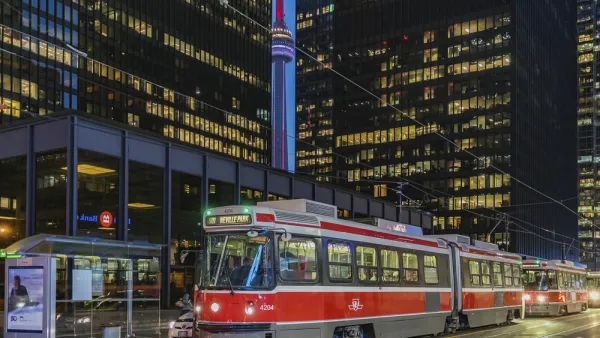The Toronto Transit Commission (TTC) is considering switching its single-trip transfer system to a more flexible time-based system allowing short return trips to be made without paying twice. Low-income and marginalized riders stand to benefit most.
Hearing the appeal of its riders, the TTC is investigating the possibility of switching to a time-based transfer system which would allow riders to re-enter the system travelling in any direction within either a 90 or 120 minute transfer window. The current system permits only one-way continuous trips and prohibits backtracking.
The time-based system - already the standard in many North American cities - would allow riders to make quick errands on a single fare but as Ben Spurr writes, “the new transfers’ most important effect would be to make public transit more equitable, by providing fare relief to the vulnerable groups who rely on the TTC the most.”
“In Toronto (as elsewhere) low-income earners are the biggest users of public transit. According to a 2010 study, 56 per cent of households earning less than $24,000 a year did not own a car, compared to 29 per cent of households making $40,000 or more.”
Transit users in Toronto are also disproportionately female (58.2%). Dr. Kara Santokie, project director for the Toronto Women’s City Alliance says “’timed transfers would ease the burden on low-income women, who are disproportionately new immigrants or from racialized groups, by allowing them to make round trips on a single fare. That’s especially important as fares continue to rise year after year.’”
Scrapping single-trip transfers would also relieve bus and streetcar operators the onerous duty of enforcing the system. The TTC estimated the switch would cost $20 million annually in lost revenue.
FULL STORY: How timed transfers would help the TTC’s most vulnerable riders

National Parks Layoffs Will Cause Communities to Lose Billions
Thousands of essential park workers were laid off this week, just before the busy spring break season.

Retro-silient?: America’s First “Eco-burb,” The Woodlands Turns 50
A master-planned community north of Houston offers lessons on green infrastructure and resilient design, but falls short of its founder’s lofty affordability and walkability goals.

Delivering for America Plan Will Downgrade Mail Service in at Least 49.5 Percent of Zip Codes
Republican and Democrat lawmakers criticize the plan for its disproportionate negative impact on rural communities.

Test News Post 1
This is a summary

Test News Headline 46
Test for the image on the front page.

Balancing Bombs and Butterflies: How the National Guard Protects a Rare Species
The National Guard at Fort Indiantown Gap uses GIS technology and land management strategies to balance military training with conservation efforts, ensuring the survival of the rare eastern regal fritillary butterfly.
Urban Design for Planners 1: Software Tools
This six-course series explores essential urban design concepts using open source software and equips planners with the tools they need to participate fully in the urban design process.
Planning for Universal Design
Learn the tools for implementing Universal Design in planning regulations.
EMC Planning Group, Inc.
Planetizen
Planetizen
Mpact (formerly Rail~Volution)
Great Falls Development Authority, Inc.
HUDs Office of Policy Development and Research
NYU Wagner Graduate School of Public Service





























